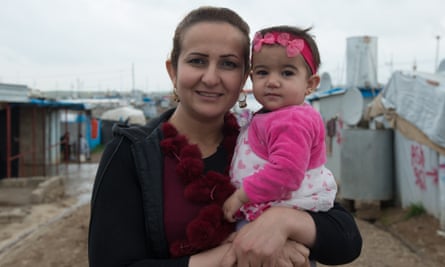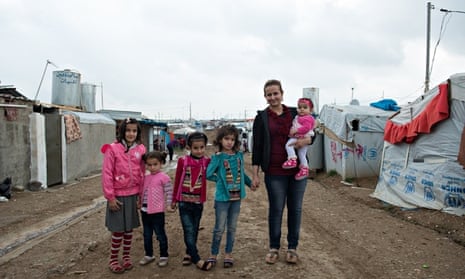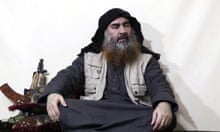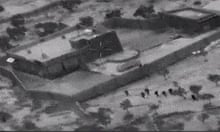We have been here for nearly four years. I still can’t quite believe it. We used to live in what was once a very nice district of Damascus. I ran a highly respected bridal beauty salon and my husband worked as an accountant for a restaurant. We had four lovely daughters. We had a nice life.
We had to leave when the fighting between rebel forces and Assad’s army broke out outside our home. One daughter, who was five at the time, found a shell from a bullet embedded in our front window frame. We lived in an apartment on the ground floor, so as the fighting got more intense we were caught right in the middle of it.
Things got so bad that for three days we couldn’t even leave the house. The electricity and water got cut off and we were running out of food. I began to think we would all die of hunger. On the fourth day, there was a lull in the fighting so we decided to make a run for it. We took nothing but my handbag with our identification cards, money and a gold necklace, which my mother had given me. We had to forget everything else, but to me that didn’t matter. The only important thing was to save our daughters’ lives.
Our children were one, three, five and seven at the time. I tried to hide my fear from them and told them nothing was wrong, but they knew something was going on. They were terrified, crying and screaming. It was difficult to calm them down.
We took a bus to Qamishli near the border with Iraq along with hundreds of other Syrians fleeing for their lives. We paid a man £2,000 to take us across the border into the Kurdish region of northern Iraq. We were in a group with two other families and six men. They took it in turns to help me carry my children. It was difficult. My youngest, Zillan, was just 17 months old at the time. We walked for four hours – half way across, my shoes got stuck in the thick mud. So I arrived in Iraq barefoot and exhausted.
We moved into a tent in the Domiz refugee camp. It was noisy and chaotic. There are now more than 50,000 people living here in a camp built for half that number. We were among the first to arrive and then there was no electricity, no bathroom and the toilet was a 15-minute walk away. You can imagine how hard that was with four young daughters.
My children kept asking, “Why are we here? Why are we living in a tent, when are we going home?” I always replied, “We will go back, just be patient.” Four years on, they have stopped asking. They have forgotten everything about their home. It makes me very sad. I never imagined I’d be bringing my children up in a refugee camp. Never.
Things got slowly better. I sold my mother’s necklace for £400 to a jeweller in the nearby town of Zakho. I bought a bit of makeup and a hairdryer and started offering beauty services to girls getting married in the camp. My husband looked after the children while I worked. I built it up bit by bit, and after a few months we were able to pay a labourer to build us a breezeblock house in the camp and then we built the salon next door. It’s only small – we all still sleep in the same room – but it’s better than a tent. We now have our own outside toilet and bathroom. In the winter, there is even hot water.
When we first arrived, I wouldn’t let my children out of my sight. I was worried about everything; about disease on the camp, about them getting lost, about the dangerous road just along from here. They just used to play outside the tent. They got bored and became naughty and difficult, and because I was tired from working all the time I would get cross with them. It was hard.
It has always been my dream to give my children a better education than me. I had to leave school at 16 because my mother was sick and needed me to look after her. I loved studying and was good at it. I wanted my children to have all the opportunities that I didn’t. Their lack of education was my biggest fear. I used to look at them playing outside in the mud and worry that they were going to end up being illiterate. Rihan, my eldest, who is now 10, missed two years of school.
Thankfully, Save the Children opened up a centre here and my eldest three – Rihan, Aisha and Sedar – started going there three days a week. They ran catch-up classes to ensure that children who had been out of the education system don’t fall too far behind. It made a massive difference, plus it enabled me to do my day job. Aisha is really smart. She got a lot out of it and so did Rihan. Sedar finds it harder to concentrate but she did really love the art classes.
Eventually, Rihan and Aisha got a place at a school that opened here. They go six days a week, mornings or afternoons, and have Fridays off. They are finally getting a good education. I try to help them a bit, too, when they get home. Sedar can’t go to school here until she is seven. If we are here next year she will start then.
There are also child-resilience workshops to help kids cope with the loss of their homes and the other distressing situations they have found themselves in. That has also been a help. I do worry what impact all this is having on them long term.

After we had been here for a couple of years, I found out I was pregnant. It wasn’t something that I thought was a good idea due to our circumstances, but there was a lot of pressure on me to have a boy.
Ten months ago, I had a little girl called Midya. She is much loved and now I don’t care whether she is a boy or a girl. Her sisters help me to look after her. She is the one good thing to have to come out of all of this. I am 31 now, so she is my last child.
Mine was the first bridal salon to open in the camp, so at first I was busy and business was good. At the height of the wedding season, I was doing one girl or sometimes two a day and got to the point where I had 20 wedding dresses for hire. Now more salons have opened and mine is quite tucked away so business has dropped. I’m only doing a few girls a month now and the money is a lot less too. Soon I think I will have to sell it.
Four months ago, my husband went to Germany to try to get residency for us. My parents, two sisters and three brothers are all there living in Bremen. We are very keen to go and join them but it is taking a long time. I can’t see it happening within the next six months, so we’ll probably be all alone in the camp with the children until then. Aside from it being hard work, I worry if his absence is psychologically damaging for them. Another thing has gone missing in their lives. They ask me every day, when is he coming back? There is nothing we can do but wait.
It is heartbreaking to have to leave your home. I have no family left in Syria now. It’s too dangerous and there is no security there. I know now that our home and everything in it has been smashed up. I won’t take my children back until the situation is settled and I do worry endlessly about them growing up in a refugee camp. But they are children. Hopefully, they will forget.
As told to Lena Corner
Some names have been changed.
To donate to Save the Children’s Syria Crisis Appeal, call 0800 8148 148 or go to savethechildren.org.uk










Comments (…)
Sign in or create your Guardian account to join the discussion